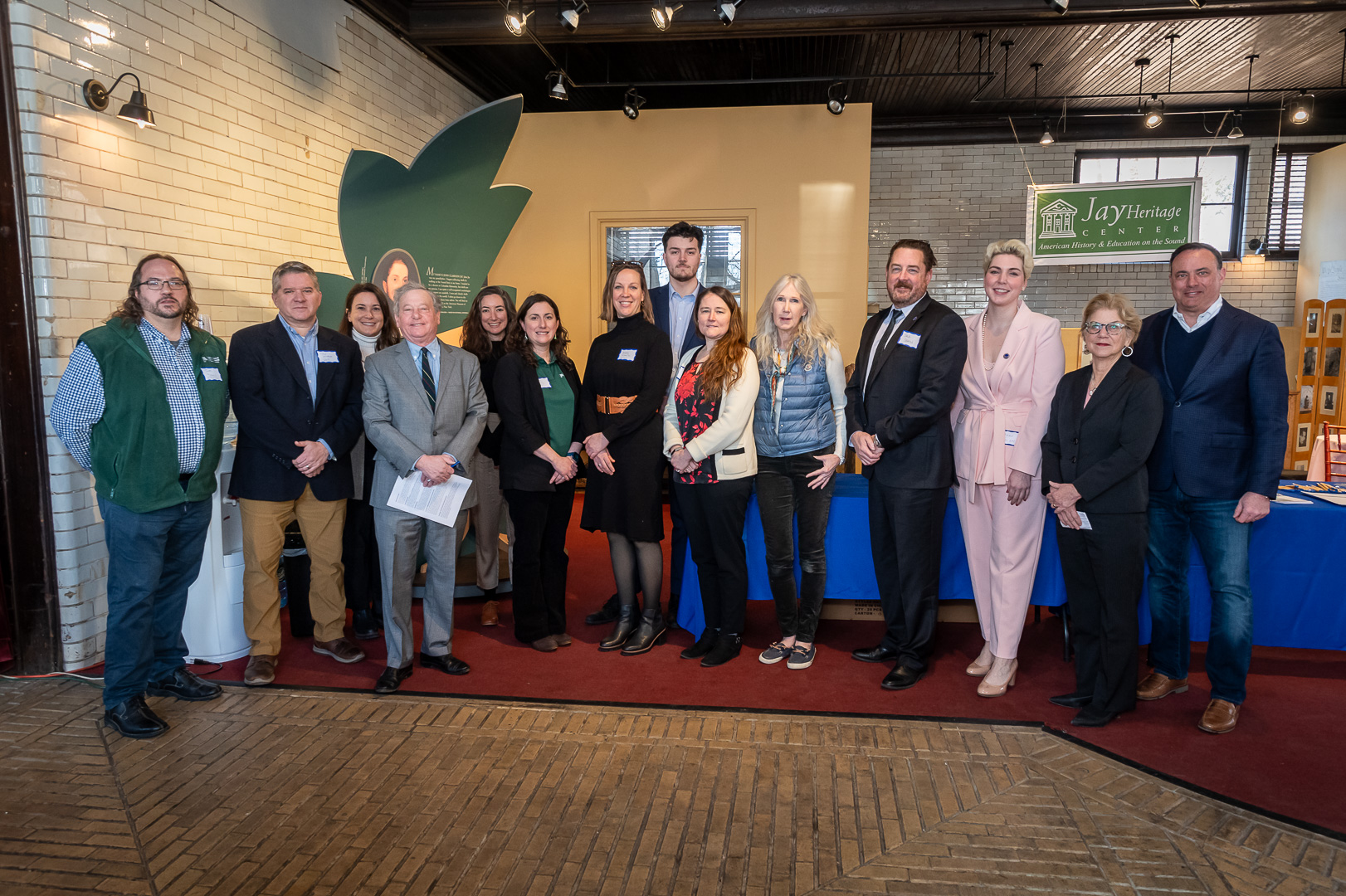Rye, NY – Westchester local government staff and officials, school representatives and environmental advocates received important updates on 2024 state grant opportunities at the 2024 Clean Water Grant Workshop hosted by State Assemblyman Steve Otis and officials of the NYS Environmental Facilities Corporation (EFC) and the Department of Environmental Conservation (DEC) at the Jay Heritage Center in Rye on February 29th.
The goal of this annual Westchester clean water workshop is to provide municipal and school district officials and staff with the latest information on the 2024 round of grants and the details regarding this year’s application process. Over 60 attendees heard presentations from six agencies that focused on currently open or upcoming grant application rounds for 2024.
One highlight of this year’s workshop was a presentation on NYS DEC’s Resilient NY Streams Study Program, which the agency has undertaken in six watersheds in Westchester County. The workshop also included details on local government’s ability to apply for several key water grant programs, including the Water Infrastructure Improvement Act (WIIA) and the Intermunicipal Grant (IMG) programs, administered by EFC and the Water Quality Improvement Program (WQIP), administered by DEC.
Assemblyman Steve Otis said, “We have held these Westchester workshops every year since 2015 when the WIIA program was created. The goal is to bring state water grant funding to Westchester communities to fund local projects. Special thanks go to Governor Kathy Hochul, NYS EFC President Maureen Coleman, and NYS DEC Commissioner Basil Seggos for the tremendous staff support for this valuable annual meeting. We were again joined this year by State Senator Shelley Mayer with whom I work closely on flood mitigation and water grant funding issues.”
New York State Environmental Facilities Corporation President and CEO Maureen A. Coleman said, “Under the leadership of Governor Hochul, EFC’s Community Assistance Teams are eager to work with state and local partners to help all New York communities access the record amounts of funding to improve critical drinking water and sewer systems. We are committed to helping communities navigate the funding process and jumpstart crucial projects that will deliver clean water and build healthy, thriving neighborhoods.”
Commissioner of the New York State Department of Environmental Conservation Basil Seggos said, “Hurricane Ida devastated many Westchester communities – underscoring the critical need for action on flood resilience and to upgrade clean water infrastructure and better prepare communities for the impacts of climate change. I thank Assemblymember Otis for bringing together municipal leaders, Westchester County officials, and State agency experts to strengthen the partnerships advancing beneficial projects and significant State investments with the support of Governor Hochul and the State Legislature.”
The Resilient NY Streams Study Program update was provided by Tom Snow who oversees DEC’s Watershed and Flood Resiliency Programs. This DEC initiative is of special importance in assisting Westchester local governments that need to address flood damage issues. The DEC program reviews past and current flood mitigation studies through state funded consultants and produces a priority list of projects to help local governments put shovels in the ground. The program also helps local governments identify funding options. The six stream studies covered Blind Brook, Beaver Swamp Brook, Mamaroneck Sheldrake Rivers, Hutchinson River, Bronx River, and Saw Mill River watersheds.
Environmental Facility Corporation Program Manager Máire Cunningham led the presentation on EFC’s WIIA and IMG grant programs as well as the agency’s Clean Water State Revolving Fund (CWSRF) program, and the federal Bipartisan Infrastructure Law grant programs also administered by the state. Cunningham also detailed EFC’s expanded technical assistance program through the agency’s Community Assistance Teams, Planning Grant programs, and other technical assistance for applicants available from EFC staff during the application process.
Additional details were provided by three presenters from NYS EFC, a speaker from DEC on the WQIP grant program, and a presentation by the NYS Department of Health.
In addition, the attendees received a talk on the NYS Department of State’s local government efficiency programs and a presentation by the NYS Office of Resilient Homes & Communities on new programs for flood damaged communities.
The full program was capped off by descriptions of grant writing assistance and other funding opportunities from the federal Sea Grant/Long Island Sound Study program.
Assemblyman Otis commented, “With ten speakers, representing six different agencies, and a full house representing local governments throughout the county, this was our most successful water grant workshop since we began hosting them almost a decade ago.”
Applications for this year’s $325 million round of WIIA and IMG grant programs are due on June 14th, 2024. More information about the application process can be found on EFC’s website. (https://efc.ny.gov/) Other programs will be announced later in the year.
Assemblyman Otis helped initiate the WIIA and IMG programs that have provided more than $2 billion in grants to local governments statewide, including nearly $130 million to Westchester municipalities for important clean water projects. Statewide grants from these water infrastructure programs alone have been awarded to over 800 projects in over 500 communities. EFC administers these programs and in coordination with the Departments of Health (DOH) and Environmental Conservation (DEC).
The workshop was co-sponsored by the Construction Industry Council of Westchester and the Hudson Valley, Federated Conservationists of Westchester County, Save the Sound, Long Island Sound Study, SeaGrant, Westchester Municipal Officials Association and the Jay Heritage Center, which hosted the workshop.
Follow-up assistance on state grant applications is available through the offices of Assemblyman Otis, Senator Mayer, or any State Assembly or State Senate member representing municipalities from Westchester.
